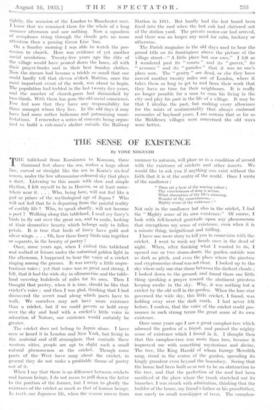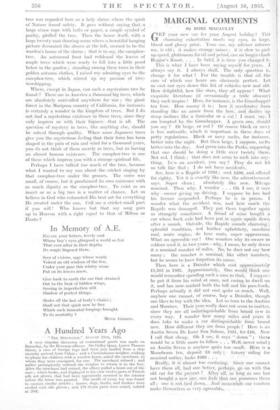THE SENSE OF EXISTENCE
By YONE NOGUCHI
.THE tableland. from Karuizawa to Komuro, three thousand feet above the sea, makes a large silent line, curved or straight like the sea in Korin's six-leaf screen, under the low ultramarine-coloured sky that plays a duet.' Listening to this music with slow and simple rhythm, I felt myself to be in Heaven, or at least some where near it. . . Who, being here, will not feel like a 'god or prince of the mythological age of Japan ? Who will not feel that he is departing from the painful reality of earthly life ? Who, to speak shortly, will not become .a poet ? Walking along this tableland, I send my fancy's birds to fly out over the great sea; and to smile, looking at their decorative beauty which belongs only to fallen petals. It is true that birds of fancy have gold and silver wings. .Oh, how these fancy birds mix together or separate, in the beauty of poetry ! • Once, some years ago, when -I visited this tableland and walked at leisure. under the autumnal golden light in the afternoon, I happened to hear. the voice of a 'cricket singing among the grasses. It was merely a little unpre- tentious voice; yet that voice was so great and strong, I felt, that it had the wide sky in ultramarine and the table- land covering huialredS of miles for its own. Then I thought that poetry, when it is true, should be like that cricket's voice ; and then I was' glad, thinking that I had discovered the secret road along 'which poets have to walk. We ourselves may not have more existence 'than a cricket, but if we could govern or hold sway Over the sky and land with a cricket's little voice in adoration of Nature, our existence would certainly be greater. • The cricket does not belong to Japan alone. I have seen or heard it- in London and New York, but living in the .material and stiff atmosphere that controls these western cities, people, are apt 'to slight such a small natural phenomenon as the cricket. Though some poets of the. West' :have sung about the cricket, in general they do not make a profitable theme of poetry out of it.
When I say that there is no difference between crickets and human beings, I.do not 'mean to pa down the latter to the position of the fornier, but I mean to glorify the existence of the cricket as much as that of human beings; In truth our Japanese life, when the -season moves from summer to autumn, will place us in a condition of accord with the existence of crickets and other insects. We would like to ask you if anything can exist without the faith that it is at the centre of the world. Once I wrote of the sunflower :
" Thou art a lyric of thy soaring colour ; Thy voicelessness of song inaction. What absorption of thy life's meaning, Wonder of thy consciousness,_ Mighty sense of thy existence "
Not only in the sunflower but also ,in the cricket, I,find the " Mighty sense of its own existence.", Of course, I look with full-hearted gratitude upon any phenomenon that strengthens .1-fly sense of existence, even when it is a minute thing, insignificant and trifling.' I have one more story to tell you in connexion with the cricket- I went to wash my hands once in the dead of night. When, after finishing what I wanted to do, I opened one or two storm-doors, the garden outside was as dark as pitch, and even the place where the pinetree and cryptomerias stood was not clear. I looked up to the sky where only one star shone between-the darkest clouds ; I looked down to the ground, and .found there one little thing speaking a prayer toward the abstinent, priestess keeping awake in the sky. Why, it was nothing but a cricket by the old well in the garden. When the lone star governed the wide sky, this little cricket, I found, was holding sway over the dark earth. I had never felt before, I confess, that the voice of the cricket could pro- nounce in such strong terms the great sense of its own existence.
Once some years ago I saw a great camphor-tree which adorned the garden of a friend, and praised the mighty sense of existence which found in it. I thought then that this camphor-tree was more than tree, because it impressed ine with something mysterious and divine. The tree, like King Harold of whom George Meredith sang, stood in the centre of the garden, spreading its kingly grandeur even beyond the boundary. Seeing that the house had been built so as not to be an obstruction to the tree, and that the perfection of the roof had been sacrificed at the place where the trunk stretched out its branches, I was struck with admiration, thinking that the builder of the house, my friend's father or his grandfather, was surely no small worshipper of trees. The camphor- tree was regarded here as a holy shrine where the spirit of Nature found safety. It goes without saying that a large straw rope with tufts or paper, a simple symbol of purity, girdled the tree. Then the house itself, with a large twenty-mat drawing-room where a beautiful hanging picture decorated the alcove at the left, seemed to be. the warden's house of the shrine ; that is to say, the camphor- tree. An autumnal frost had reddened the leaves of maple trees which were ready to fall into a little pond below in the garden ; standing among these trees in their golden autumn clothe's, I raised my admiring eyeS to the camphor-tree, which stirred up my passion of tie& worshipping.
Where, except in Japan, can such, a mysterious tree be found ? There are in America a thousand big trees, which are absolutely unrivalled anywhere for 'size ; • the giant forest in the Mariposa country of California, for instance, is certainly a wonder in the kingdom of trees. But I do not find a mysterious existence in those trees, since they only impress us with their bigness—that is all. The question of mystery in trees, like anything else, should be solved through quality. When some Japanese trees give you the mysterious feeling-that their form has been shaped in the pain of rain and. wind fora thousand years, you do not think of them merely as trees, but as having an almost human existence. The camphor-tree is one of these which impress you with a strange spiritual life.
Perhaps I have talked too much of the tree, because what I wanted to say was about the cricket singing by that camphor-tree under the grasses. The voice was small, of course, but it proclaimed its own existence with as much dignity as the camphor-tree. To exist as an insect or as . a big tree is a matter of chance. Let us believe in God who exhausted His best art for everything He created under the sun. Call me a cricket-small poet if you will ! Who knows but that my song goes up to Heaven with a right equal to that of Milton or Dante ?



































 Previous page
Previous page